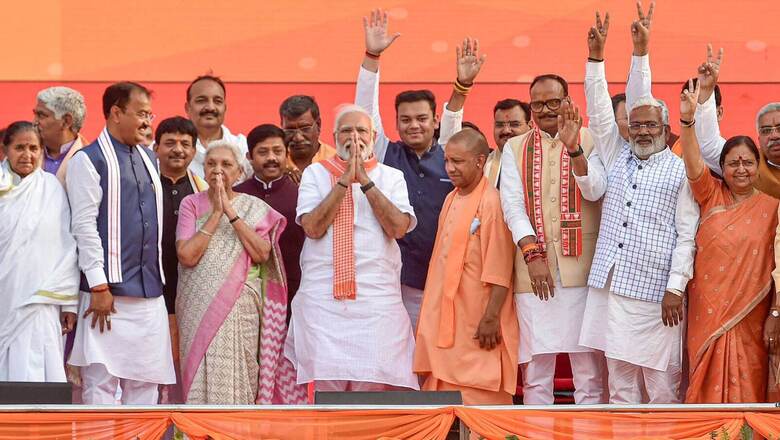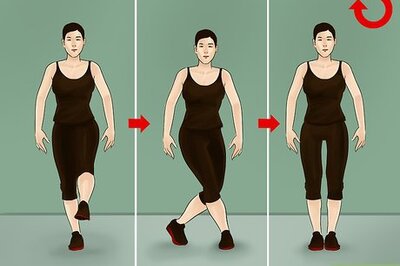
views
What happened at Ekana stadium in Lucknow on Friday will resonate for decades to come. For the first time in the history of Indian politics, three Dalit women took oath as cabinet minister and ministers of state. It is an oft-repeated saying that Dalit women face the double whammy of caste and gender in terms of social oppression. With the phenomenal rise of Mayawati, there was a sense of optimism in this segment but unfortunately it did not last. The failure of Mayawati to cultivate a second generation of leadership was the greatest disservice to the Bahujan movement. She had an opportunity that came to her on a platter owing to the hard work, tireless dedication and sacrifices of Kanshiram who single-handedly created the political capital for Dalits and backward communities in Northern India.
Baby Rani Maurya comes from the same community as Mayawati and has served in a constitutional capacity as the governor of Uttarakhand. Similarly, both Vijay Lakshmi Gautam and Gulab Devi come with an inspirational body of work in public life as former ministers and elected representatives. The list does not end with them. Kanta Kardam, another Dalit woman from the Jatav community, is the face of Uttar Pradesh in the Upper House of Parliament from the BJP.
Professor Kaushal Panwar of the Indira Gandhi National Open University, who is among the few Dalit woman professors in the country, said, “I fully welcome the inclusion of three woman from the Dalit community in the UP government, this level of representation for our women is a step in the direction of realisation of the dreams of Babasaheb Ambedkar.”
The Pasmanda Question
In the name of secularism, the ruling-elite class of a certain orientation has institutionalised the political tradition of appeasement in the last seven decades. One must not miss the inclusion of Danish Azad Ansari, a young leader who comes from the Pasmanda Muslim community of weavers, i.e. the Bunkar caste — great poet-saint and social reformer Kabir belonged to this community.
ALSO READ | Nalin Mehta Writes: Three Reasons Why Experts Got It So Wrong on BJP in UP
“For the first time in the Uttar Pradesh government, Muslims of Indian origin (Pasmanda) have been given representation in the form of Danish Azad, which shows the seriousness of BJP towards social justice in Muslim society. Earlier, Sardar Patel had included Noor Muhammad and Abdul Qayyum Ansari in the government of Bihar soon after the country’s independence, against the opposition by the Ashraf leaders of then Congress party. It should be known that indigenous Pasmanda Muslims constitute 90 per cent of the total Muslim population, but in the name of Muslims, representation has been provided only to the foreign ruling class of Ashraf Muslims,” said Dr Faiyaz Ahmad Fyzie, author, columnist and a medical doctor by profession.
The forces in the Opposition have traditionally ignored the issues of the marginalised among the Muslims. The BJP government in Uttar Pradesh made the Madarsa Board inclusive by appointing Iftikhar Ahmed Javed who comes from the Bunkar samaj; similarly for Urdu Academy, it nominated Choudhary Kaif-ul-Wara who is again a Bunkar; minority commission chief Ashfaq Saifi is from Badhai samaj.
H.L. Dusadh, an eminent Dalit thinker on Bahujan issues, observed: “In India, if there is any party which does politics with heart and soul, it is undoubtedly the BJP. This fact has become clear again today after seeing the council of ministers of Yogi Adityanath. Reinstalling Keshav Prasad Maurya as deputy chief minister despite his election loss is a shocking decision. Such a decision could have been taken only by a visionary party like the BJP. It is sure to be fructiferous for 2024.”
“Similarly, in the era of weakening Dalit politics in UP, establishing three Dalit women as ministers is also a very mentionable decision, which ought to benefit the party in 2024. Making Ashish Patel from the Apna Dal and Sanjay Nishad of the Nishad Party as ministers, would also be considered a visionary decision. On the whole, the BJP leadership’s taut game plan of social engineering in cabinet sharing is set make the road for 2024 more difficult for the oppositions,” Dusadh added.
It is clear that the UP cabinet is Sabka Saath, Sabka Vishwas in action and the BJP will take everyone along, regardless of their caste, community and gender, making everyone a stakeholder in New India.
Guru Prakash Paswan is the National Spokesperson of the BJP and Author of ‘Makers of Modern Dalit History’. The views expressed in this article are those of the author and do not represent the stand of this publication.
Read all the Latest Opinion News and Breaking News here


















Comments
0 comment